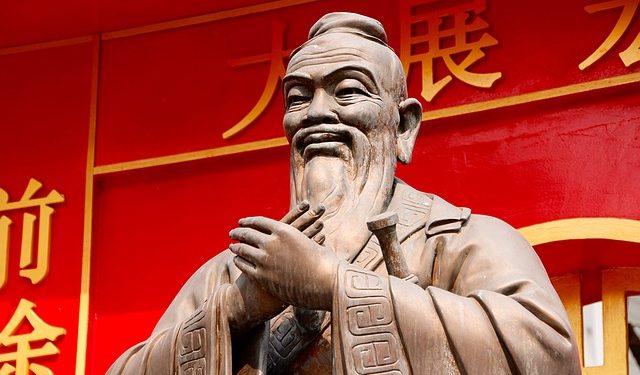Human Rights Watch has set out a 12-point ‘code of conduct’ to advise education institutions on dealing with the Chinese government and what it calls “efforts to undermine academic freedom abroad”. It includes the tip to reject offers from China to host Confucius Institutes on global campuses.
News and business analysis for Professionals in International Education
Have some pie!
Human Rights Watch warns of China threat via Confucius Inst.
 The centres take their name from the Chinese philosopher who emphasised social harmony. Photo: Pixabay
The centres take their name from the Chinese philosopher who emphasised social harmony. Photo: Pixabay The report by the global human rights watchers says Chinese authorities have stepped up efforts to monitor students who choose to study overseas and “interfere with academic freedom”.
“Reject Confucius Institutes”
Human Rights Watch said its 12 points are meant to ensure HEIs and schools can defend the integrity of institutions and the freedom to work of both Chinese and other students and staff.
Several bullet points aim to promote pre-emptive activity to defend academic freedoms through publicity efforts, and actions and systems to protect students and faculty from outside pressures. It is also recommended that institutions record and report any and all cases of “direct or indirect Chinese government harassment, surveillance, or threats on campuses.”
Another eye-catching recommendation comes midway through the code of conduct, with the suggestion to “Reject Confucius Institutes”.
The global institutes exist on 548 campuses globally, according to the Hanban (Confucius Institute headquarters) website, and have been the centre of controversy despite publicly aiming to “promote Chinese language learning & teaching, and the understanding of the Chinese culture… and to bridge cultural and educational exchanges”.
Human Rights Watch claimed the CI’s are an extension of the Beijing government’s power and censor learning materials “on political grounds”.
The advice was written after more than 100 interviews with academics from Europe, North America and Australia. Some reported “discomfort with the presence of Confucius Institutes,” especially when the CIs were invited to campuses “without broad faculty consultation”.
“Colleges and universities that stand together are better equipped to resist Chinese government harassment and surveillance on campuses, visa denials, and pressures to censor or self-censor,” said Sophie Richardson, China director at Human Rights Watch.
In a statement, HRW said academics had complained of politically slanted interview questioning, and outside pressure being applied to the extent that staff “modified their remarks” for fear of being denied access by Chinese authorities.
“Academics modified their remarks because of fears of being denied access to China”
“Two described academics participating in hiring panels in which the candidates were questioned during job interviews about their views on Confucius Institutes,” it stated.
“Many of those interviewed said they modified their remarks inside and outside classrooms because of fears of being denied access to China or to funding sources, of causing problems for students or scholars from China or their family members, or of offending or irking students or scholars from China,” it added.
Richardson continued, arguing that traditional academic methods of ensuring honesty were not working.
“Universities can’t continue to rely solely on honor codes or other statements of principle designed to address issues like cheating, plagiarism, or tenure to address pressure from the Chinese government on academic freedom abroad,” she said.
However, when The PIE News asked institutions or organisations working with the Chinese government and CIs to comment on the report, only the UCL Institute of Education was able to provide a response (at the time of publication).
“The UCL Institute of Education’s Confucius Institute for Schools supports schools across England with the introduction and delivery of Chinese as a language option in the mainstream school curriculum. We believe there to be an enormous benefit in enabling school pupils to learn Mandarin Chinese on the grounds of broadening language options in schools, furthering cultural engagement, and in response to China’s growing importance on the world economic stage,” a spokesperson said.
“The work of the IOE Confucius Institute has not posed any threat to free and open debate within either the university or the schools with which we work. We believe cultural engagement and exchange is valuable to all,” they continued.
UUKi said such choices were left to individual institutions.
Human Rights Watch full code can be found here.
Still looking? Find by category:


